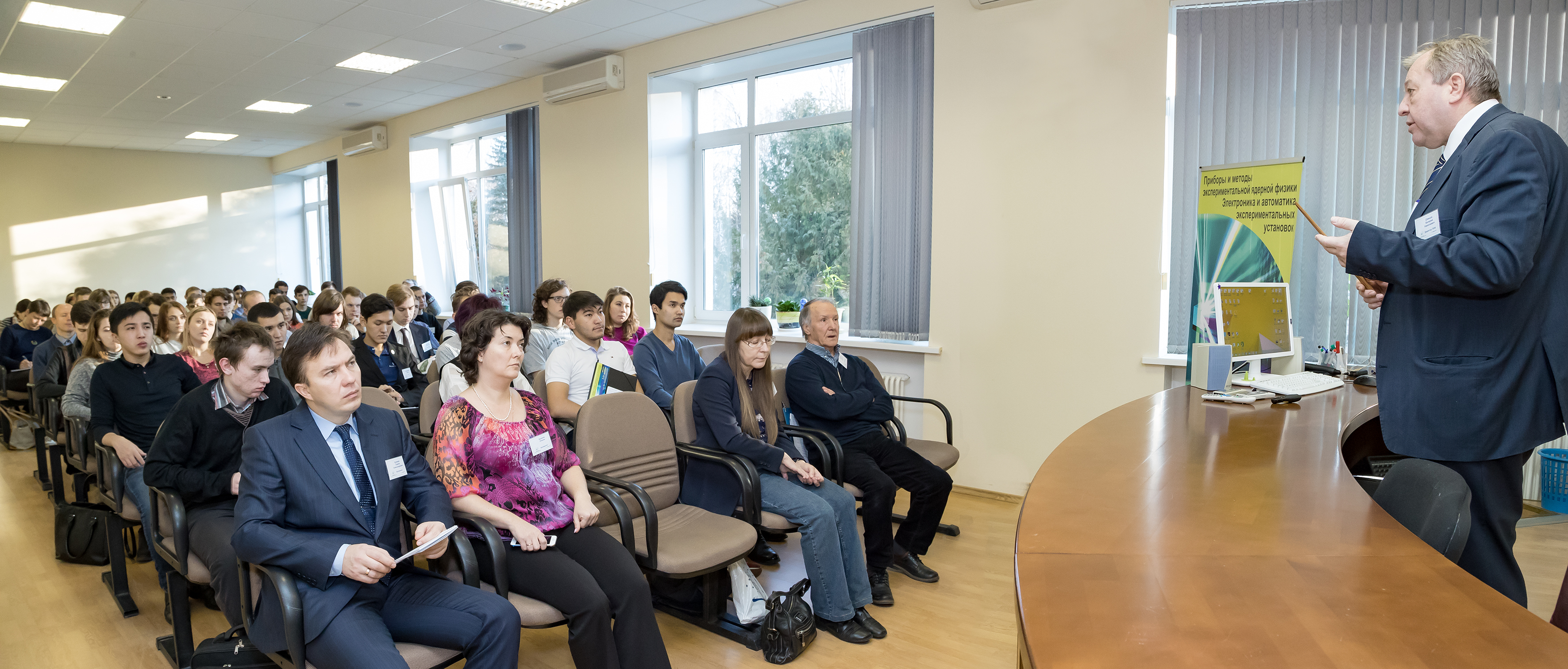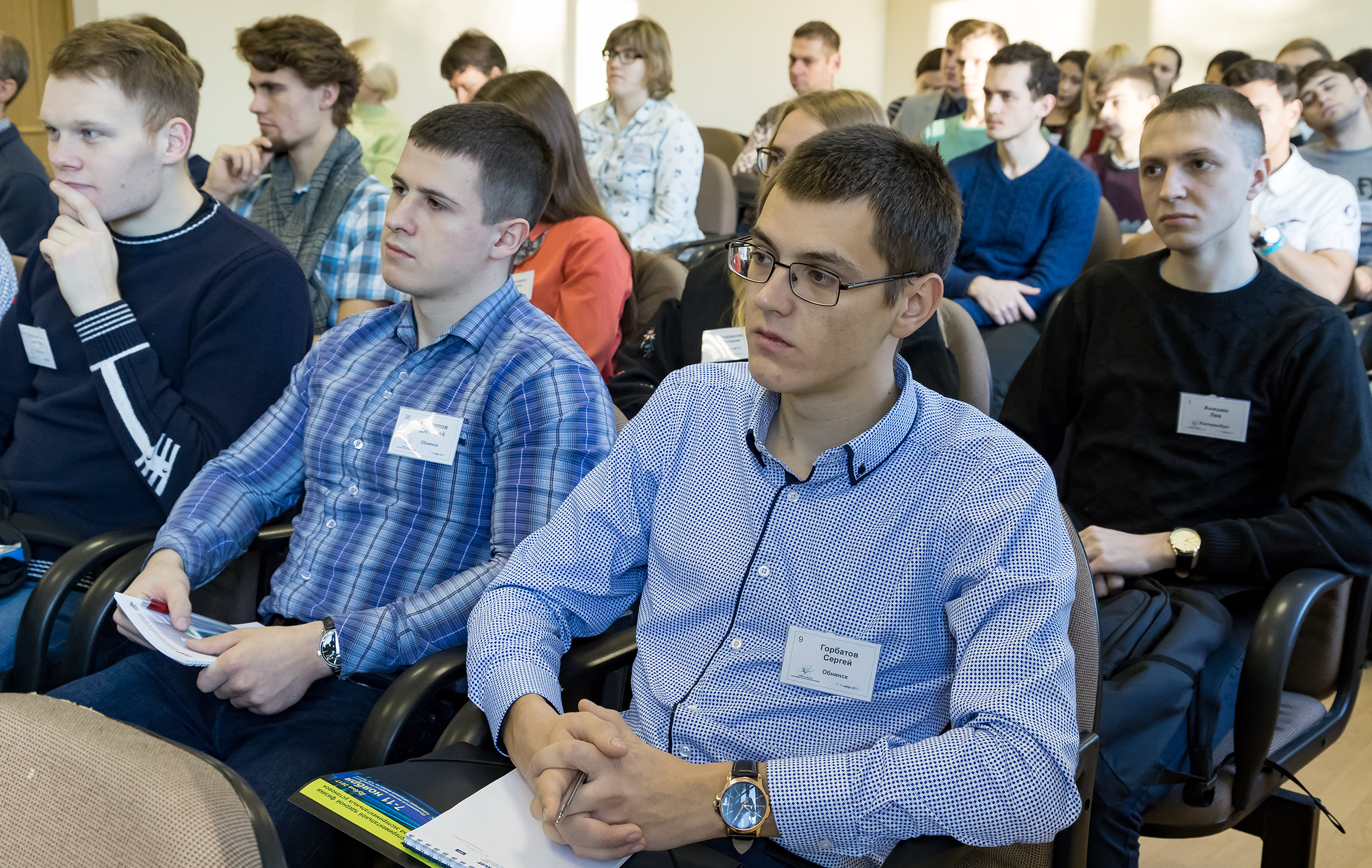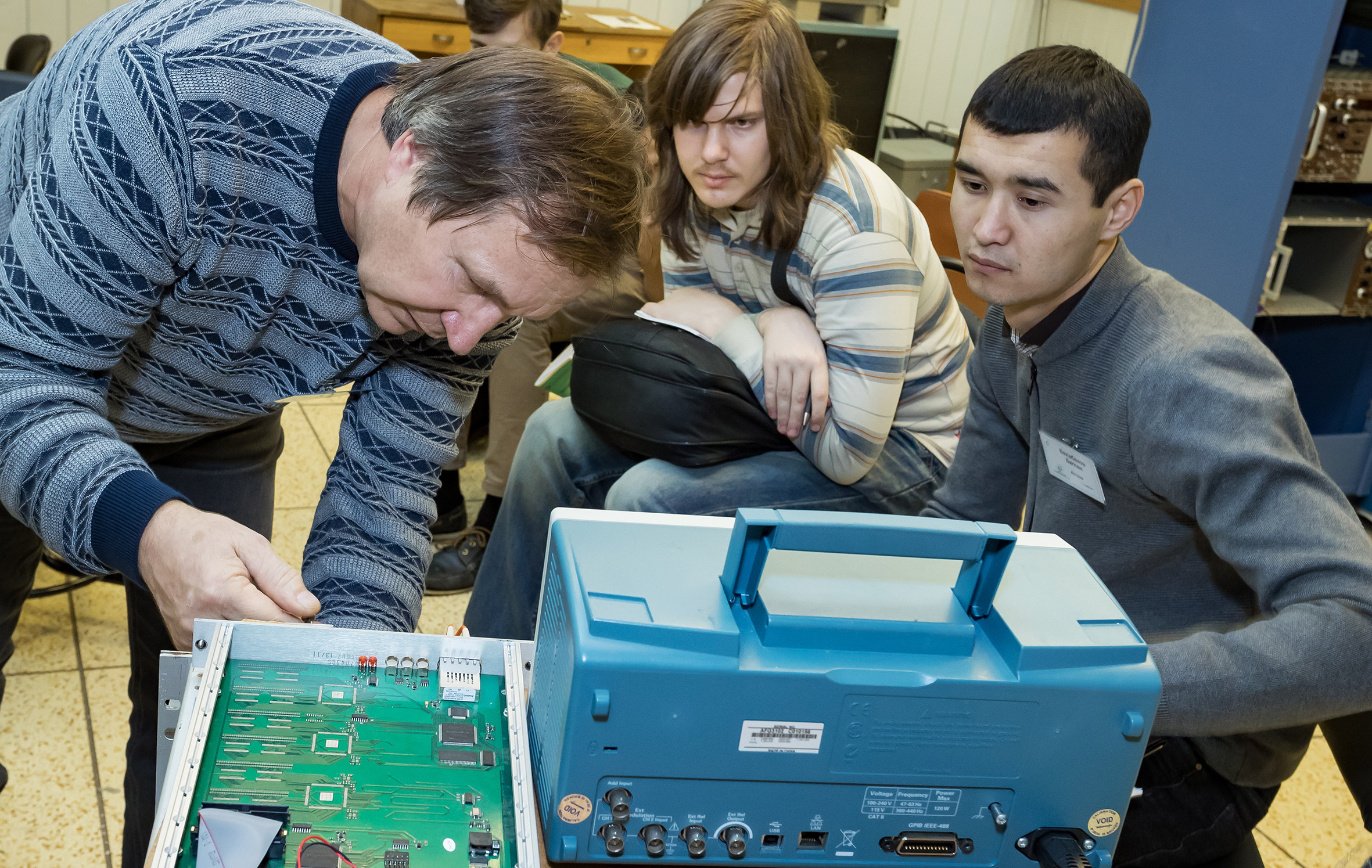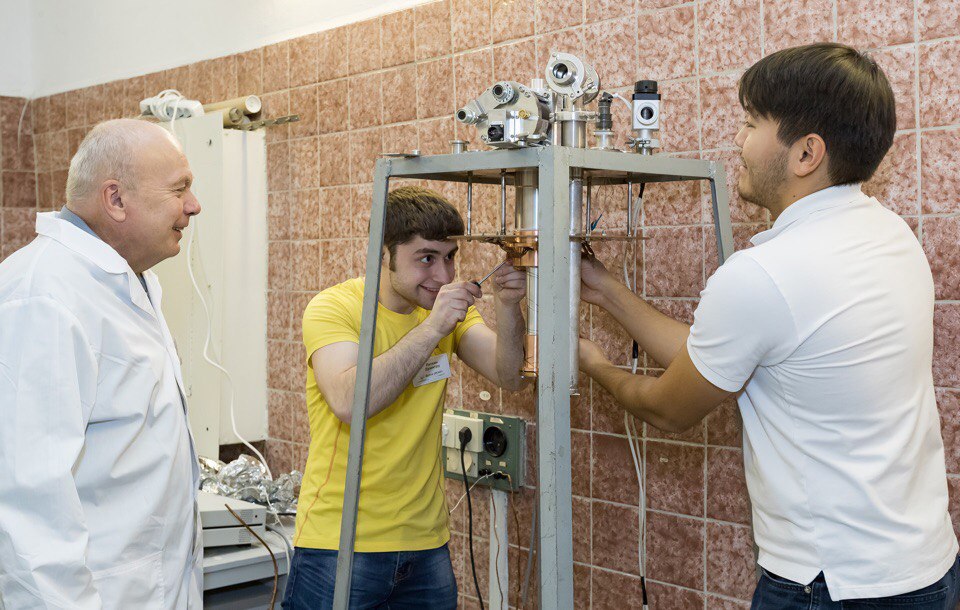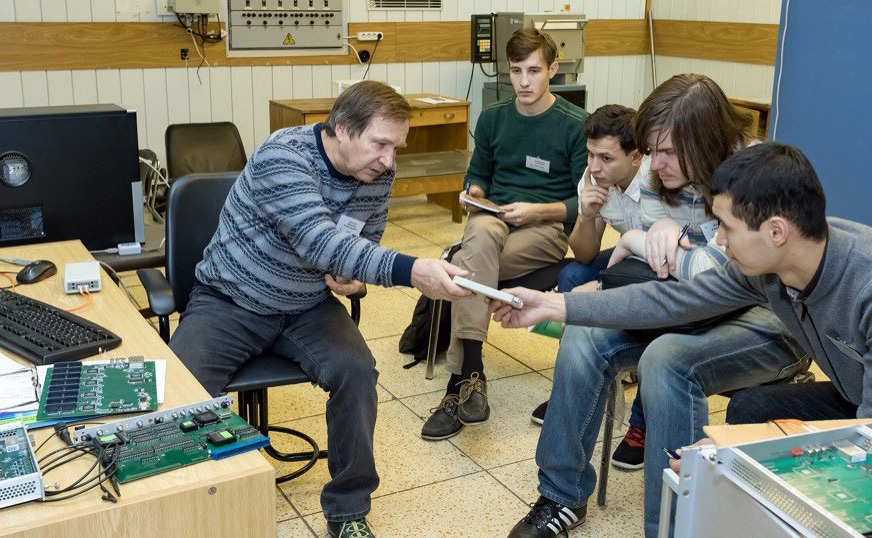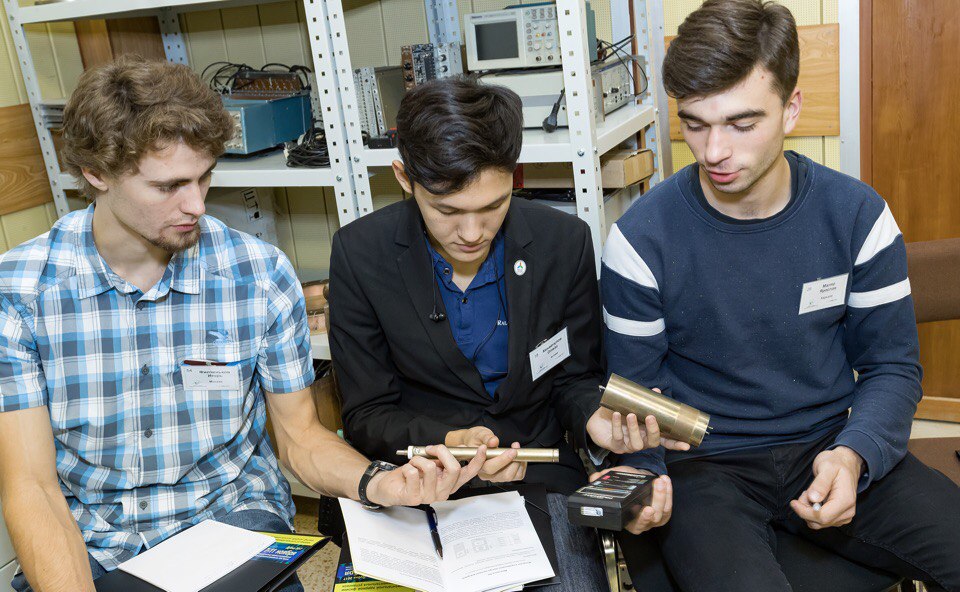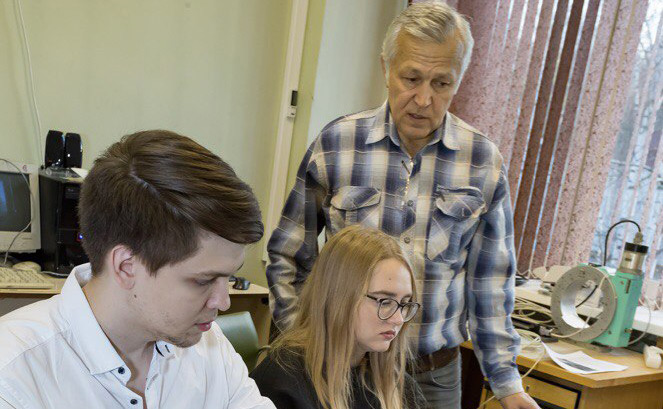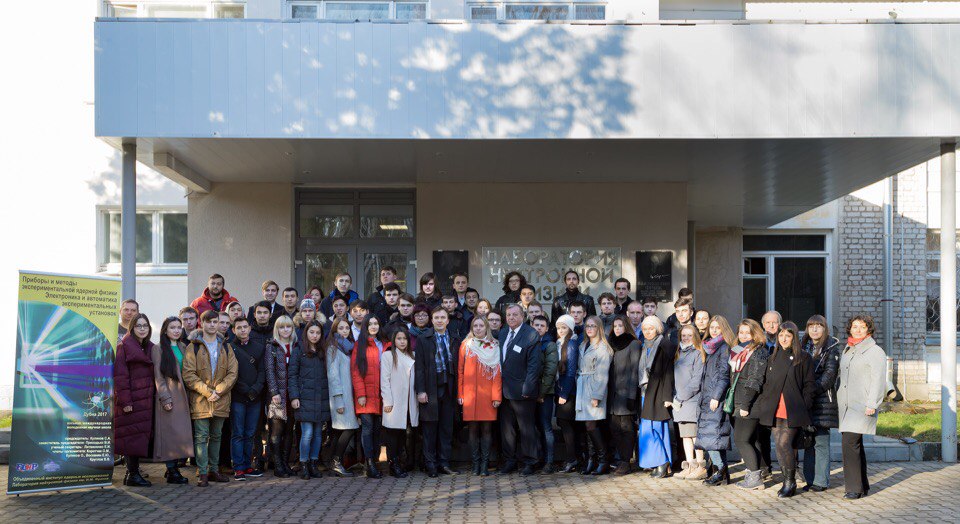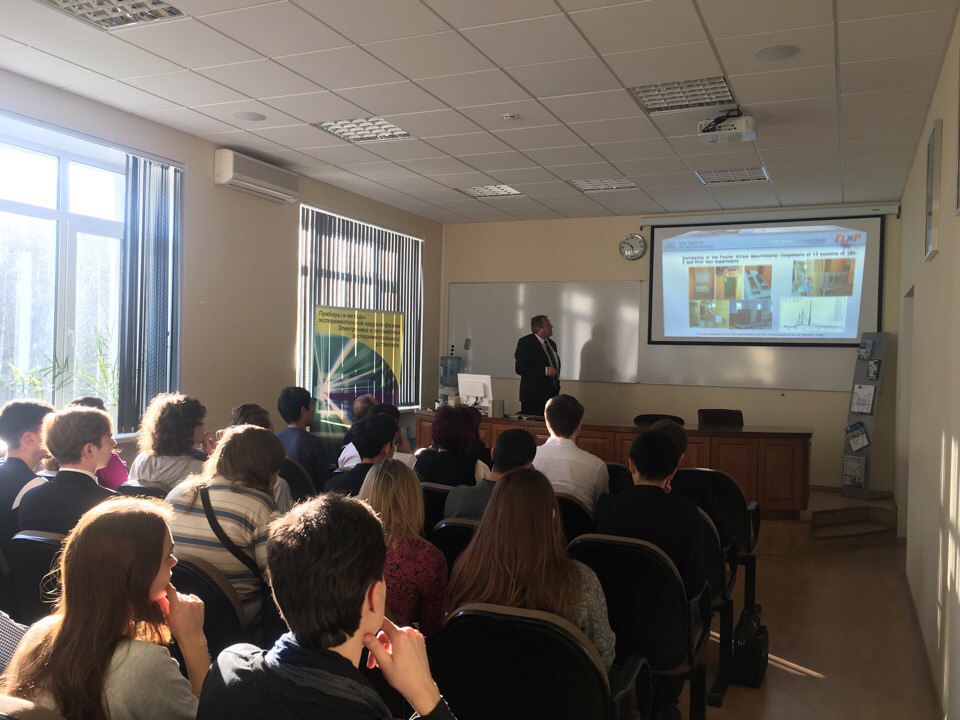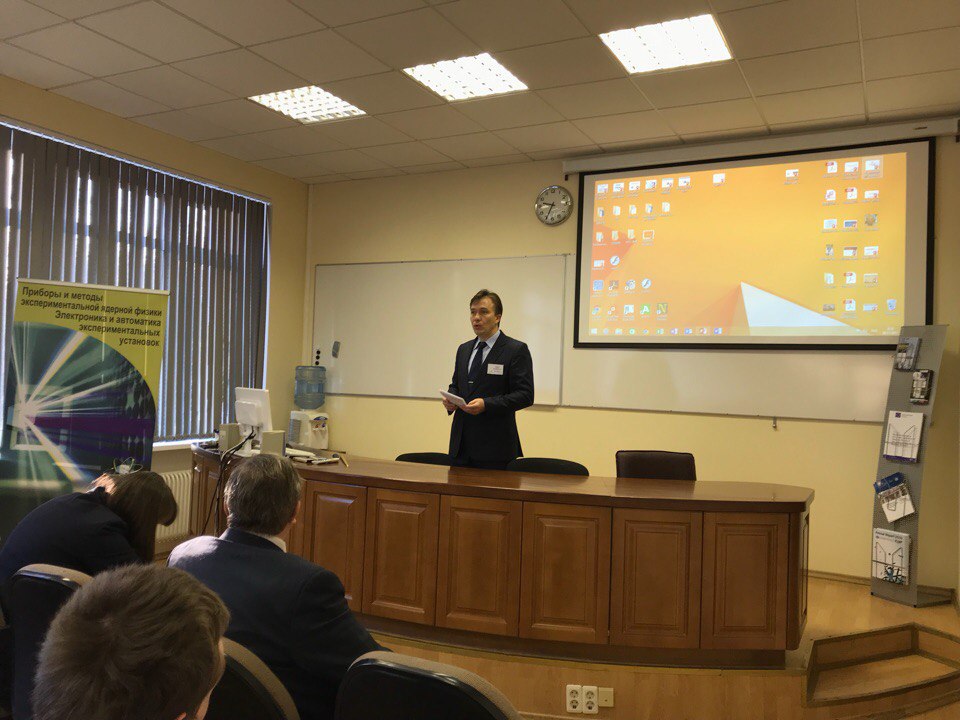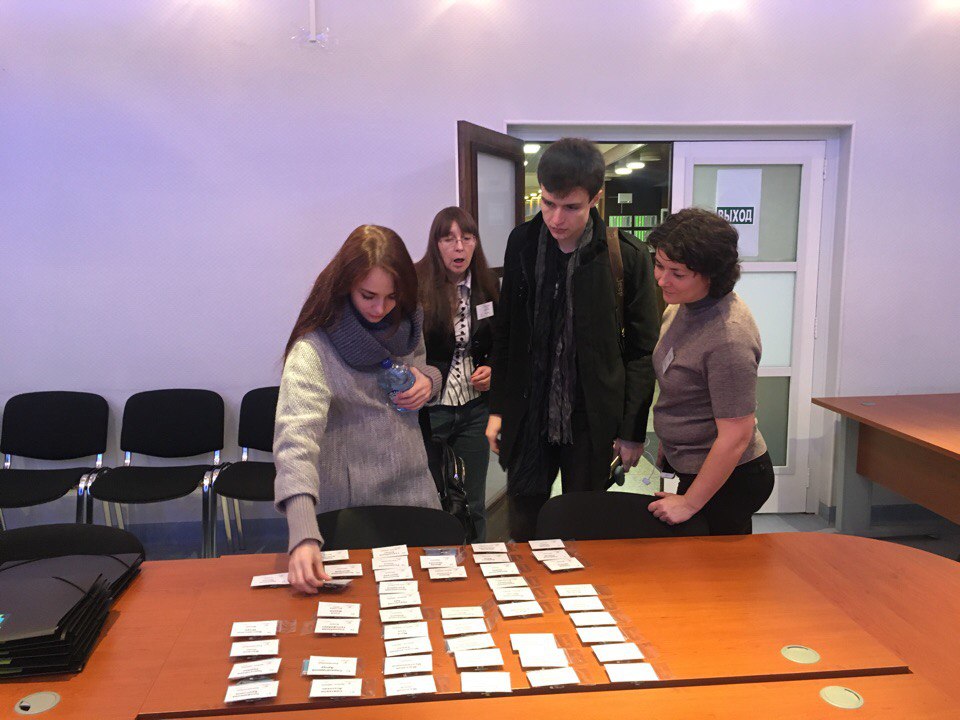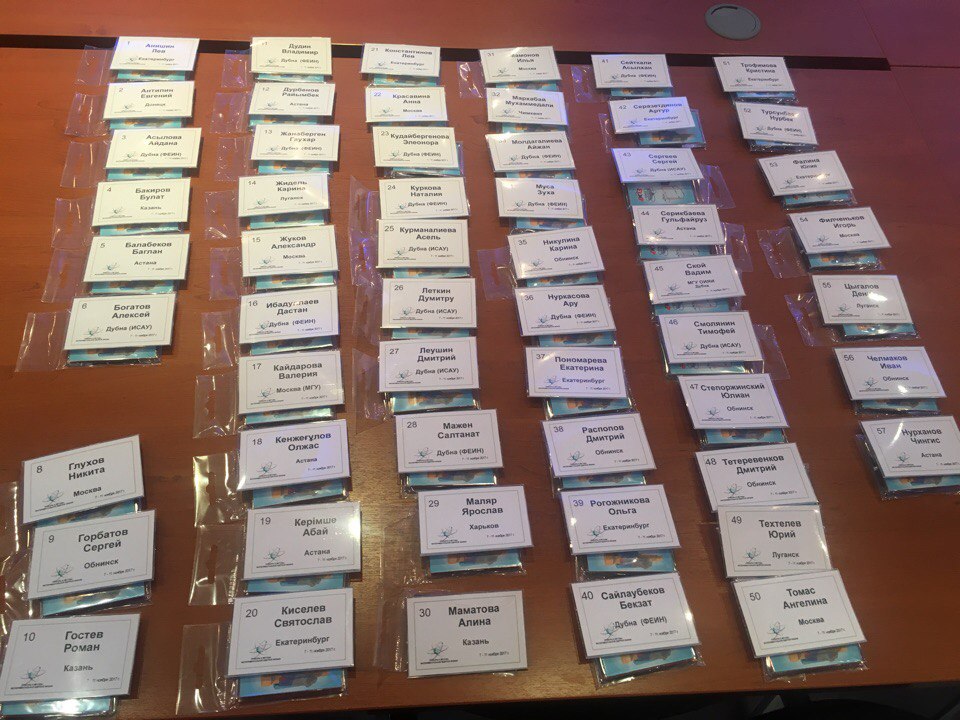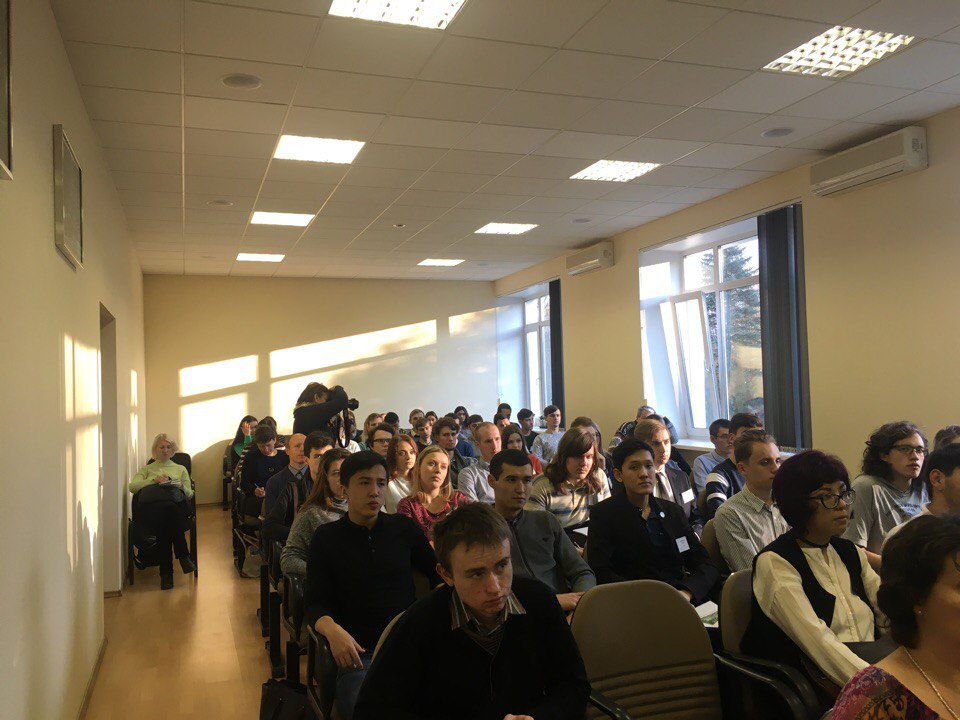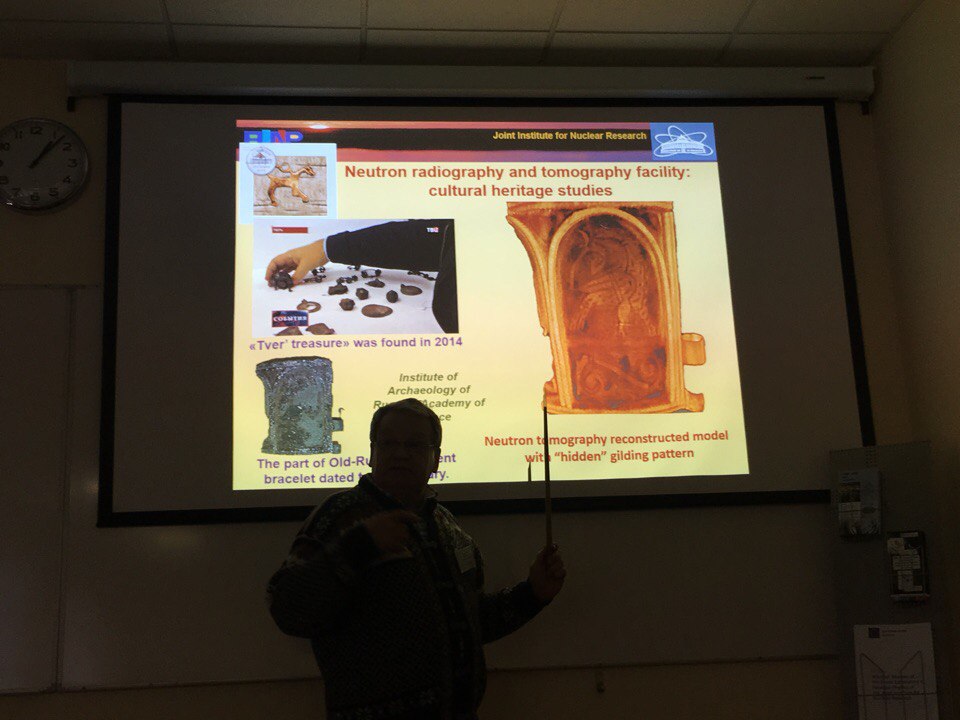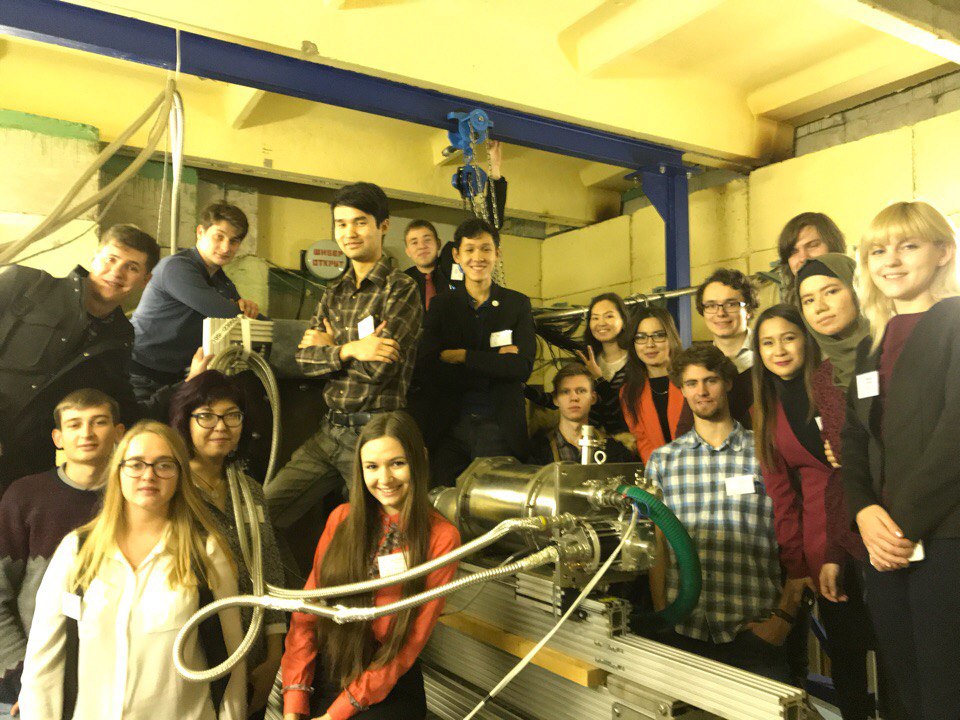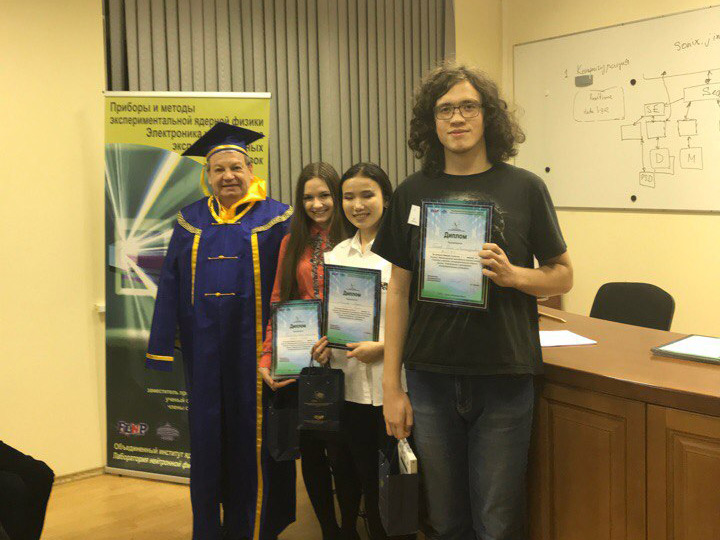Educators and Students about the past FLNP School
Education, 15 November 2017
On 8 – 10 November 2017 in the Frank Laboratory of Neutron Physics the 8th International School for Young Scientist and Students «Instruments and Methods of Experimental Nuclear Physics. Electronics and automatics of experimental facilities» was held. The school programme included lectures on current state of electronics and software of neutron spectrometers, instruments and methods for neutron physics experiments, and several practical trainings. School participants were acquainted with the unique experimental facilities of FLNP.
–We acquired valuable experience in organizing the School, and a part of its audience returns to us,” V.N.Shvetsov continued the greeting. “The audience is not so large, in fact, we cannot host a large one, and we carry out the selection of participants for the School. It may seem immodest, but I want to say that JINR is one of the best places to pursue science, especially nuclear and particle physics. JINR carries out research in the fields of highenergy physics, neutron physics are carried out. The world centre of new superheavy elements synthesis is just 500 meters far from here.
Thanks to the JINR Directorate, starting from V.G. Kadyshevsky who established JINR University Centre in the difficult 1990th, the education component is developing. Today JINR University Centre is a freestanding Department of JINR in which annually more than 500 young people take diverse educational programmes. Follow the web – sites of JINR and JINR University Centre and take part in educational programs! In recent years JINR budget increased annually for 20 – 22 per cent. Thanks to that, we put into action large scientific projects, buy modern equipment. We have an opportunity to select the best young scientists. Study, come to our laboratory, we are waiting for you!
Photos by Elena Puzynina
As S.A.Kulikov, Chairman of the Organizing Committee, told the reporter of the JINR weekly newspaper, this year only 60 participants were selected for the School, as the experience of last years had showed that if there is a larger number of participants, practical trainings become less effective. 3 people competed for 1 place at the School. Students, postgraduates, and several Junior researchers from universities and institutes of four countries and a dozen of Russian cities came to Dubna. Traditional JINR partners participated in the School among which there were Kazakhstan, Ukraine, Armenia, and Belorussia. As JINR based department was established at Kazan Federal University, several participants came from Kazan. There were also participants from Ural, Obninsk, Moscow, and Dubna State University. The regular FLNP School conrtibutes significantly in training of personnel. When the School was organized for the first time, there was only 10 per cent of young scientists in FLNP. Nowadays, one forth of FLNP specialists are young researchers. This demonstrates an upward trend. The School is evidently in strong demand as students come to take part in summer trainings, to implement their graduation projects. S.A.Kulikov noticed that numerous interesting and contemporary tasks for the School to touch upon are connected with robotics and with new directions such as mechatronics, programming, and cryogenic technique.
Photoes by Sergey Kulikov
As for practical trainings of the School, S.A.Kulikov remarked that it gives an opportunity to students to get acquainted with both detectors and cryogenic electronics of new facilities. However, the primary objective of the programme is to share basic knowledge that can be used in practice on FLNP spectrometers. In the course of practical trainings, participants worked with modern equipment used in current experiments. There was a competition of reports as usual, and more than 10 works were declared. All participants of the School were given certificates, and winners of the reports competition got memorable prizes.
In the course of the School, a delegation from Kazan headed by Director of KFU Institute of Physics paid a visit to Dubna. Guests examined education activities of Kazan students sent to the School, got acquainted with practical trainings, had a talk with School’s lecturers on the further cooperative establishment of educational programmes that would make it possible to send students to Dubna to study for MD.
Konstantin Bonus: I study at Minsk Aviation Academy, and I was keen on equipment, systems, and methods of control. These topics closely correlate with my specialization. Some speakers explained the material very thoroughly, everything was clear. Practical trainings also deserved the highest praise. I looked through possible themes of bachelor’s papers on the JINR website, and I am likely to come here to work at it.
Elizaveta Cherepanova: I took part in the School last year when I was a student at Ural Federal University with a specialization “Nuclear physics”. In the course of the School, I learnt a lot of interesting things, especially in the fields of neutron physics, detectors, JINR at large. I liked JINR and I’d like to come back here again. I found a supervisor for my diploma and entered the magistrate of MIPT at the JINR – based Department. And today I came to the School to meet people from UrFU.
Dmitry Teterevenkov: We study at Obninsk branch of MEPhI. I did not know that there is such an innovative centre in Dubna. There is an extensive range of equipment around the reactor, I learnt a lot about the reactor itself. The lecture on the reactor and spectrometers by S.A.Kulikov was of great interest to me. We work at non-destructive testing and signal processing. And there is a branch of activity at the reactor connected with non–destructive testing by means of neutrons. That is why the School was interesting and relevant to us.
Asel Kurmanalieva: Nowadays I am a first-year Magistrate student at Dubna State University with specialization “System analyses and management of complex systems development”. The theme of the School does not directly correlate with my specialization, but my Bachelor’s degree I got in Alma-Ata is “Computer engineering and software”, and I was keen on physics since the school years. During the first practical training, we learnt the “Sonix” software; today we are going to have one more training on programming. My brother works in DLNP and tells many fascinating things. I want to work in JINR a lot, but my knowledge, unfortunately, is still insufficient. To be honest, basic knowledge is presented better here.
Yuri Tehtelyov: I basically keen on spectophotometery, and neutron spectrometry resembles it. I saw how software is thought over here, how it is dealt with, and I learnt much from it. During practical trainings, I learnt a lot about the facilities we do not have and their using. Practical experience is much more important, but we mostly study theoretical matters. I am going to graduate from Luhansk Taras Shevchenko National University with MD. If I had visited this place earlier, I would have changed my paper’s topic. Unfortunately, now it is late to do it. However, some things may be noticed in my work, there is still something to work at.
Dmitry Raspolov: Dubna is very beautiful city, it resembles Obninsk. Even the year of establishment is similar – 1956. Practical trainings were interesting. Our group specializes in technical diagnostics and instrument engineering, so this School is what we need. School educators explain everything clearly; we can also communicate with those who are able to explain complicated things and to help land a job. If we have the opportunity, we will come here without hesitation next time and advice others the School because it is the unique possibility for young scientists and specialists to educate.
Following the article by Olga Tarantina, the JINR weekly newspaper
